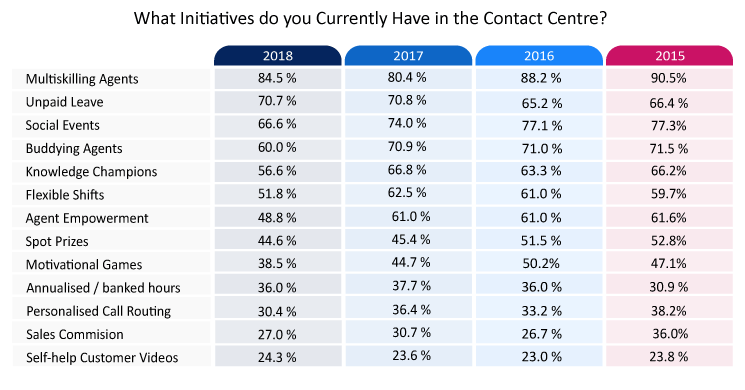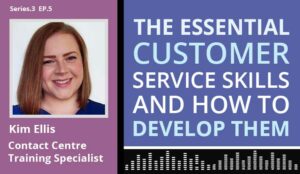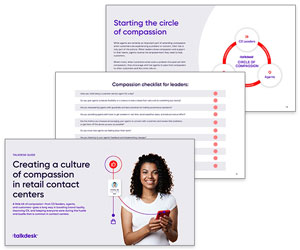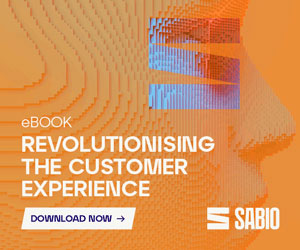We take a look at the most valuable skills of a contact centre advisor and how you can help to develop them.
1. Fact-Finding
One of the most fundamental attributes of good customer service is resolving the customer’s query. So, problem-solving is key and fact-finding is the skill behind that, according to Kim Ellis, a contact centre training specialist from GO GINGER learning solutions.

Problem-solving begins with having the right information, so advisors need to be skilled in fact-finding to best navigate the call.
Kim says: “Problem-solving begins with having the right information, so advisors need to be skilled in fact-finding to best navigate the call.”
“The first step to improving an advisor’s fact-finding is to improve their autonomy. Many contact centres still measure advisor performance in the wrong way and tell them what to do and how to fix problems. This doesn’t empower advisors to find the best solution for a particular customer.”
Here, Kim highlights the danger of prescriptive training, i.e. training that only focuses on finding a solution and not whether it is the best solution possible for a particular customer.
So, we need to focus on making the contact centre customer-centric to encourage advisors to find more information that will help them to problem-solve better.
One suggestion is to ensure that advisors’ performance is not evaluated by efficiency-based measures, such as Average Handling Time (AHT) and occupancy, and instead make customer satisfaction your contact centre mission.
2. Empathy
Showing empathy is key in better resolving the customer’s issue, especially when emotion is involved. It helps to show the customer that you’re interested in them, as you take ownership of their issue.

Sympathy is feeling the same as the customer and agreeing with them, but empathy is putting yourself in the customer’s shoes.
According to Kim: “The first step to improving an advisor’s levels of empathy is to ensure that they know the difference between empathy and sympathy.”
“Sympathy is feeling the same as the customer and agreeing with them, but empathy is putting yourself in the customer’s shoes. It may be impossible to feel the same as the customer, but you can share empathy.”
With this understanding of what empathy means in a customer service environment, it can be good to share tips with advisors on how to best convey empathy in the contact centre.
Remember the importance of active listening, as gaining an understanding of why the customer feels the way that they do is key to showing authentic empathy.
Kim Ellis
One tip that Kim suggests is to “remember the importance of active listening, as gaining an understanding of why the customer feels the way that they do is key to showing authentic empathy.”
Active listening is, therefore, an important first step in showing empathy, while acknowledging the customer’s issue, reassuring them of a solution and providing a sense of immediacy are also important.
Good listening is also key because advisors can jump to conclusions, rather than getting to the bottom of the problem, so they end up tackling the symptoms and not the problem. The old adage is that you have two ears and one mouth.
For more on this topic, read our article: 18 Empathy Statements That Help Improve Customer-Agent Rapport
3. Emotional Intelligence
Emotional intelligence is the ability to identify your own emotions and the emotions of others and then use this information to guide your behaviour, according to Kim Ellis.

Emotional intelligence is a skill that needs to be practised in everyday life, and some will already be better at it than others.
Building on this Kim says: “I coach emotional intelligence through four key modules; self-reflection, self-management, relationship and emotional intelligence in the workplace.”
“Only one of these involves any reference to the contact centre, as emotional intelligence is a skill that needs to be practised in everyday life, and some will already be better at it than others, but that doesn’t mean that it can’t be coached.”
In the contact centre, emotional intelligence is important as if we can identify the customer’s emotional drivers, we can more easily put their mind at ease.
As Nick Drake-Knight discusses in our article “How to Build an Emotional Connection with Customers“, there are two key drivers for entering the contact centre. These are: movement away from anxiety/discomfort or movement towards comfort.
With this in mind, if the advisor can identify the customer’s emotional driver, by using their emotional intelligence, they can build a stronger emotional connection with the customer.
Lack of emotional intelligence on the contact centre floor can lead to decreased productivity, missed deadlines, increased absence, more mistakes and a higher employee turnover.
However, Kim reminds us that emotional intelligence isn’t just important on the phone, it also has value within the contact centre itself.
Kim says: “Lack of emotional intelligence on the contact centre floor can lead to decreased productivity, missed deadlines, increased absence, more mistakes and a higher employee turnover.”
4. Knowledgeability
Having the right knowledge to answer the customer’s query in the best way for them is an essential skill, but it is important to have some control over what advisors are learning, to ensure that it’s in the interest of the customer.

We need to ensure advisors have the right knowledge and don’t pick up any tips that may be detrimental to customer satisfaction.
Kim says: “You can only teach advisors a certain amount in induction training and, although it has been disproved to some extent, there is a certain amount of truth in the 70/20/10 rule.”
The 70/20/10 rule refers to the theory that most learning is taken in while doing the job itself and not in a training environment. In fact, the learning is broken down as follows:
- 70% is taken in on the job
- 20% is taken in through continuous training
- 10% is taken in induction training
With this being the case, we need to ensure that myths don’t spread around the contact centre that may impact the advisor’s performance.
As Kim says: “Retaining masses and masses of knowledge isn’t essential, but ensuring advisors go to the right place to find that knowledge, while maintaining good control over the call, is.”
So, we need to ensure advisors have the right knowledge and don’t pick up any tips around topics like lowering handling times from colleagues, which may be detrimental to customer satisfaction.
To do this, we can monitor the knowledge management system, dispel myths in training using tools like the Johari Window and take other steps to create a network-judgement culture.
5. Tech-Savvy
It is a great skill for advisors to quickly navigate contact centre systems while maintaining a strong conversation with the customer. This comes more naturally to some than others.

It’s good for advisors to be tech-savvy so that they are quickly adept in handling new systems, but anybody can do it, it just takes time.
But as Kim says: “While it’s good for advisors to be tech-savvy so that they are quickly adept in handling new systems, anybody can do it, it just takes time.”
However, contact centres are notoriously stretched for time, so it’s good for advisors to team up in training, so that the less tech-savvy advisors don’t fall behind.

Kim Ellis
Kim suggests: “In training, buddy up advisors, while ensuring that those who aren’t the most tech-savvy are buddied with advisors who are a little better in this area.”
“This being said, you must exercise caution when buddying people up. You don’t want to partner these lower-skilled advisors with experts, who will speed through everything, but rather with advisors that will move at a more comfortable pace.”
Remember, look for an advisor who is patient and supportive and has other mentoring skills. The last thing that you want is for a struggling advisor to feel unsupported and undervalued.
For more tips on making buddying work, read our article: How to Develop Coaches and Mentors in a Contact Centre
6. Patience
Often, a customer will call into the contact centre just to vent their frustrations, and patience is key here, but it is also important in every other customer–advisor interaction.

Be patient and listen for any key nuggets of information that may offer you the chance to improve rapport and maybe even offer a better solution.
Kim says: “It is common for advisors to think of their next call as ‘just another call’, but to the customer, it could mean everything. Therefore, it is key to be patient, which is a skill that goes hand in hand with empathy.”
“Remove customer frustration and avoid jumping in with a solution. Instead, it is key to be patient and listen for any key nuggets of information that may offer you the chance to improve rapport and maybe even offer a better solution.”
One of the worst things that an advisor can do is to overwhelm the customer with lots of information and leave them to make a decision. It is instead important to listen and fill the customer’s emotional needs as well as those that are functional.
It is instead important to listen and fill the customer’s emotional needs as well as those that are functional.
So, it is good to train advisors to use a mixture of open, probing and closed questions, as well as to use both push and pull communication.
Also, with patience comes resilience. We tend to recruit advisors who are happy chatty types and then subject them to angry and upset customers – repeatedly. So it is also good to look for resilience when recruiting, and coach advisors how to best handle angry customers.
7. Flexibility
Flexibility can be a great bonus for the contact centre because if advisors feel comfortable in handling different contact types, advisors can move from channel to channel to best meet demand.

It depends on the nature of your contact centre. If you like advisors to switch between multiple channels and multiple contact types, flexibility is key.
Yet, as Kim says: “The importance of flexibility is something that depends on the nature of your contact centre. If you like advisors to switch between multiple channels and multiple contact types, it is key.”
“However, if you prefer advisors to have a speciality, it can be more beneficial to focus on other skills like empathy and patience, as these are the key to great conversations.”
Asking the team to switch between channels does bring workforce management (WFM) benefits and can add variety to what can be a very repetitive advisor role.
While it is understandable to want advisors to have a speciality, asking the team to switch between channels does bring workforce management (WFM) benefits and can add variety to what can be a very repetitive advisor role.
So, if you decide to ask advisors to switch between different channels, it is important to foster their flexibility, perhaps by lowering occupancy to give them time to refocus between contacts or providing them with smart desktops.
8. Sociability
It’s good for advisors to be sociable, so they can build natural rapport. While we can use strategies to mimic rapport, it is better to do so authentically.

Being sociable is great in creating good conversations, but make sure you don’t get to a point where the advisor dominates the conversation.
But Kim warns: “It works both ways. Being sociable is great in creating good conversations, but you don’t want it to get to a point where the advisor dominates the conversation. We need to remember that it is the customer who is the most important person in the conversation.”
While sociable extrovert advisors can bring great energy to a call, there is a worry that they will enjoy the sound of their own voice too much.
So, every now and then, it could be a good idea to remind advisors that the customer is the focus of the call before the call and encourage advisors to be a little more patient.
But being sociable is still a very important skill to help build the atmosphere of the contact centre. Asking sociable advisors to help arrange social events, run advisor focus groups and design motivational games can really help to build a great atmosphere.
For ideas of motivational games, read our article: Motivational Games for Call Centres
9. Motivation
Motivation is key to keep improving and doing our utmost for the customer, so it’s important to work to get to know our team to discover what motivates them as individuals.

Once we know what the advisor wants, we can support that internal motivation and keep the team enthusiastic about their role.
Kim says: “Firstly, we should be looking for motivated people in recruitment, and over time, as we get to know our advisors better, we will begin to understand their greatest motivations better.”
“Once we know what the advisor wants, whether that’s job progression, recognition or just more of a challenge, we can support that internal motivation and keep the team enthusiastic about their role. The key is in getting to know your team well.”
This is the only way that we can make sure that the motivation is intrinsic and that advisors are going the extra mile for all the right reasons. But it is up to us to keep recognising the advisor’s hard work and to refuel their desire with recognition.
If an advisor’s motivation is job progression, make sure that they have a progression path to follow.
If an advisor’s motivation is job progression, make sure that they have a progression path to follow and make sure this provides advisors with a purpose that can be transferred into energy to help the customer.
10. Team-Orientation
Everyone may have their individual motivations, but it is great to be team-focused, so that advisors share tips with one another and create a nice environment for people to work in.

If the team are happy to help each other out and get on well with one another, retention and morale will naturally improve.
Contact centres are synonymous with high levels of absenteeism and attrition, but if other members of the team are happy to help each other out and get on well with one another, employee retention and morale will naturally improve.
However, as our recent survey indicated, fewer and fewer contact centres are arranging social events which advisors can use to create positive memories with their co-workers.
In fact, it was the third year in a row that the number of contact centres organising such events for their advisors has declined, with only 66.6% now doing so.

This table was sourced from our survey: What Contact Centres Are Doing Right Now – How Do You Compare? (2018 Edition)
If we want to develop a team focus, these events are important and will likely help to improve attrition and absenteeism.
It is also good to celebrate the seasonal festivities, charity events and so on to help bring the team a little bit closer together.
In Summary
There are many other skills such as organisation, attentiveness and creativity that have not been included on our top ten list.
But while it can be great to foster these attributes, we have pinpointed these ten as they are particularly great for boosting performance, advisor happiness and customer retention.
However, it’s not enough to just recruit for these skills, you need to develop and maintain them. By following some of the tips discussed in this article, you will be off to a good start.
Good luck!
For more on improving advisor soft skills, read our articles:
- Super-Agents: The Top Ten Qualities of Great Contact Centre Agents
- Top Tips to Improve Listening Skills on the Telephone
- Top Tips for Building Rapport on the Telephone
Author: Robyn Coppell
Reviewed by: Megan Jones
Published On: 20th Feb 2019 - Last modified: 6th Apr 2024
Read more about - Skills, Coaching, Editor's Picks, Empathy, Kim Ellis, Listening, Soft Skills, Training





































